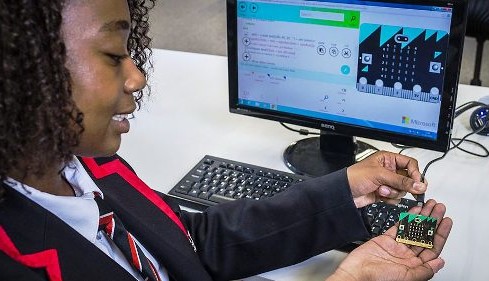BBC micro:bit Update
July 08, 2015
on
on

Some months ago we reported that in the UK, the BBC were planning to shower unsuspecting school children with free pocket-sized codeable computers. Their most recent press release this week shows the final design of the board which will start to arrive in schools in late October this year.
According to Tony Hall, Director-General of the BBC: "Just as the BBC Micro introduced millions to personal computers 30 years ago, the BBC micro:bit can help equip a new generation with the digital skills they need to find jobs and help grow the UK economy. It's the unique role of the BBC that allows us to bring together an unprecedented partnership to deliver such an ambitious project."
It is said to be the BBC’s most ambitious education initiative for 30 years, up to 1 million devices will be given to every 11 or 12 year old child in year 7 or equivalent across the UK, for free. The 4 x 5 cm board runs a 32-bit ARM Cortex-M0 CPU, currently the smallest ARM processor available and has a 5 x 5 matrix of LEDs, two push buttons, a compass and accelerometer and communicates via Bluetooth (Smart).
The operating system has been developed at Lancaster University by a team led by Dr. Joe Finney and uses ARM mbed technology for hardware interfacing. Microsoft has developed two code editing interfaces, the Block Editor for beginners and the Touch Development Environment, for older users. The system can be programmed in Java, C++, Python and Block.
The BBC micro:bit initiative aims to make a huge impact in 2015 with the BBC and its partners committed to providing up to 1 million micro:bits before the end of the year. The technical specifications for the device will be open-sourced, and the partnership plans to collectively develop a not-for-profit company to oversee and drive the micro:bit development. They plan to make micro:bits commercially available in the UK and internationally through various outlets by late 2015.
According to Tony Hall, Director-General of the BBC: "Just as the BBC Micro introduced millions to personal computers 30 years ago, the BBC micro:bit can help equip a new generation with the digital skills they need to find jobs and help grow the UK economy. It's the unique role of the BBC that allows us to bring together an unprecedented partnership to deliver such an ambitious project."
It is said to be the BBC’s most ambitious education initiative for 30 years, up to 1 million devices will be given to every 11 or 12 year old child in year 7 or equivalent across the UK, for free. The 4 x 5 cm board runs a 32-bit ARM Cortex-M0 CPU, currently the smallest ARM processor available and has a 5 x 5 matrix of LEDs, two push buttons, a compass and accelerometer and communicates via Bluetooth (Smart).
The operating system has been developed at Lancaster University by a team led by Dr. Joe Finney and uses ARM mbed technology for hardware interfacing. Microsoft has developed two code editing interfaces, the Block Editor for beginners and the Touch Development Environment, for older users. The system can be programmed in Java, C++, Python and Block.
The BBC micro:bit initiative aims to make a huge impact in 2015 with the BBC and its partners committed to providing up to 1 million micro:bits before the end of the year. The technical specifications for the device will be open-sourced, and the partnership plans to collectively develop a not-for-profit company to oversee and drive the micro:bit development. They plan to make micro:bits commercially available in the UK and internationally through various outlets by late 2015.
Read full article
Hide full article



Discussion (0 comments)